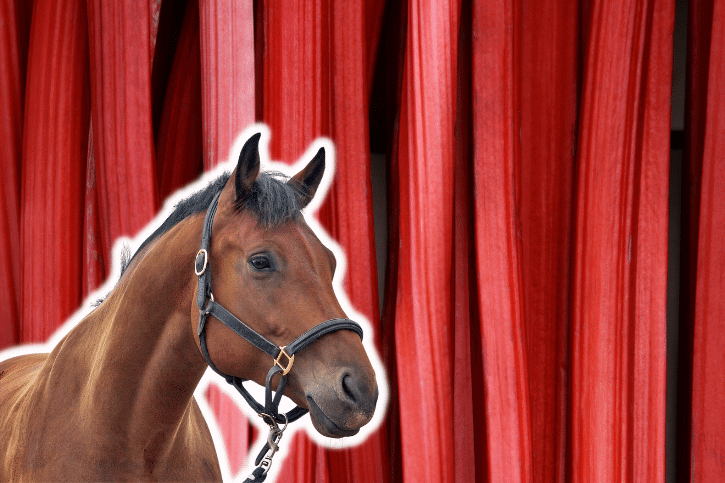Can Horses Eat Rhubarb?
I was out in the garden one day tending to my veggies in the bright morning sun.
New flowers had just bloomed and some vegetables were ripe for harvesting.
But of course I couldn’t just go ahead and harvest without the help of my young mare who just so happened to break her way into my garden once again.
She occasionally would take a snap at my veggies which I don’t mind.
Haven’t we all been guilty of stealing the occasional snack?
But today I had to stop her as she took a chomp at one of my new veggies which had just ripened: my rhubarb.
“Can horses eat Rhubarb?” I quickly led her back to the paddock.
The answer is no! Horses cannot eat rhubarb. While the stem of the rhubarbs cause no harm to a horse, the shiny leaves contain lethal poisons which will lead to irritating the digestive system and urinary. Rhubarb toxins will attack the kidneys and cause severe damage, and in some cases, death.
If a horse were to eat rhubarb, what would happen?
Would they need emergency treatment?
Keep reading to find out.
What Will Happen If My Horse Eats Rhubarb?
If your horse happens to eat rhubarb, toxins will be released and will soon start to attack the digestive and urinary tract. Inevitably if not treated immediately, will lead to kidney failure due to kidney stones developing.
Your horse will become very sick, and in a lot of cases, develop depression.
The poison will cause many bodily problems, from pains in the stomach, urinary problems as well as swelling and burning around the mouth area.
In more severe cases, your horse may experience seizures, become induced in a coma, and in rare cases, pass away.
Severity of the poison can vary from horse to horse, with factors of age, weight, and health condition affecting how severe the poisoning will be.
The amount ingested, and time before treatment will also affect how severe the poison will be.
Although it is rare for a horse to pass away from rhubarb poisoning it is not unheard of.
The longer it takes for the horse to receive treatment, the closer the horse comes to kidney failure.
How Can I Tell If My Horse Has Rhubarb Poisoning?
There are plenty of symptoms of rhubarb poisoning, none of which should be taken lightly.
Although rhubarb poisoning can look similar to other poison symptoms, always take your horse to a veterinarian for treatment if there is any chance of poisoning, even if you are not sure.
Symptoms of rhubarb poisoning are:
Stomach Pain
Burning in the throat and/or mouth
Nausea or vomiting
Diarrhea
Loss of appetite
Increased urination
Discoloured urine
Development of kidney stones
Seizures
Staggering and/or trembling
Difficulty breathing
Hyperparathyroidism
Weight loss
Rough hair coat
Rhubarb poisoning can be divided into two categories: acute, or chronic.
Chronic
Chronic rhubarb poisoning is when a large amount is consumed at once, or in a short amount of time.
Symptoms of chronic poisoning will be symptoms of the kidneys shutting down such as increased drinking and urinating, depression as well as tremors.
The poison because of the amount of ingested, will directly attack the digestive tract and veterinary assistance will be required immediately.
Acute
Compared to chronic rhubarb poisoning, acute rhubarb poisoning is when rhubarb leaves are ingested over typically over a long period of time, and will not attack the digestive and urinary tract directly.
Calcium levels will begin to decrease, and symptoms of this can be weight loss and swelling in the head and general mouth area.
How Do I Treat Rhubarb Poisoning?
If your horse has eaten rhubarb, emergency veterinary help will be needed.
Waste no time to call up your local horse vet and get help immediately.
If treated in time, poison can be removed from the body with little or no harm to your horse.
If you’re able to get help before the kidneys are attacked, your horse will be given fluids and parenteral calcium to balance calcium levels.
Your horse may be in recovery for many months if hyperparathyroidism is present, and oral calcium will be given to reduce kidney stones.
In the long run, the horse’s diet may also need to be changed to cater to the damage of the kidney.
How Long is The Road Till Recovery?
In a veterinary centre, your horse will be under care for a few days, or even a month until they are able to be released.
Being put on fluids for an average of 48 hours and removal of the poison can be a timely thing.
Even after recovery from the vet, it may take months for your horse to recover back to their original happy, healthy self.
If the poisoning was severe and the kidney’s were attacked, your horse may be on medicine for months, or even a year.
A diet change may also be required to support your horse’s damaged kidney.
Can Horses Eat Rhubarb Stem?
Unlike the leaves, the stem of a rhubarb does not contain any toxins, but it isn’t recommended that you feed your horse the stem either.
The risk that there may be a small piece of leaf on the stem doesn’t seem to be worth it.
Rhubarb leaves are extremely poisonous and should be avoided at all cost for your horse.
If ingested, immediate veterinary attention will be required before the kidneys shut down.
If the poison is removed before the shut down, you will need to take extra caution for your horse and they will be medicated for many months to come, and a diet change may be needed for your large friend.
Although only the leaves are poisonous, it’s recommended rhubarb be kept completely away from horses for safety precautions.
